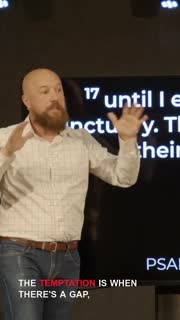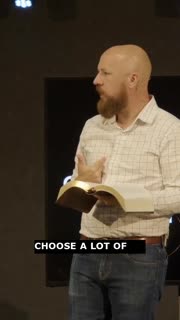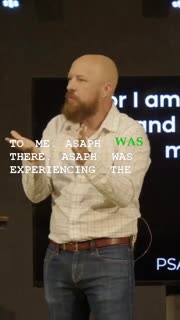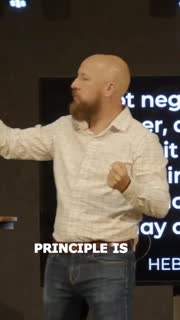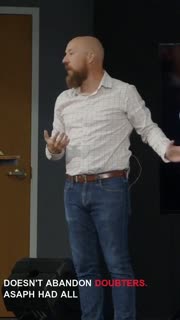Navigating Doubt: Trusting God's Promises Amid Struggles
Devotional
Sermon Summary
Bible Study Guide
Sermon Clips
### Quotes for Outreach
1. "Sometimes my experience with God, I think of it as kind of a combination lock. I think that if I turn the right combination, then God's going to turn the right combination, God is supposed to unlock some things. That if I come to church three out of the four weeks, if I give some money, if I sing the songs, if I do the right things, then God should be doing the right things for me." [02:32] (18 seconds)
2. "The temptation is when there's a gap, because that's what it ultimately is. There is a gap between what I believe and what I experience. And what you put inside of that gap really, really, really matters. When you in your life experience a gap between what you believe about God and your current reality, if you put in sentences, if you put in criticism, if you put in doubt, if you put in anger, those things are going to push you further away from God." [13:32] (25 seconds)
3. "Never doubt in the dark what God told you in the light. Because there was a time, there was a time in your life where you believed God was good. And you believed God was faithful. And you believed that God loved you. And you believed that God was for you. And it's not hard to believe that when your life is going great." [33:22] (16 seconds)
4. "I don't get to choose a lot of things. But what I can do on Sundays and on Wednesdays and on Thursdays and on Fridays and in the middle of the night, my soul, bless the Lord. And all that's within me, bless His holy name. My soul, bless the Lord. And do not forget all of His benefits. Don't doubt in the dark what God told you in the light." [35:02] (21 seconds)
### Quotes for Members
1. "What do you do when what you believe is different than what you experience? Again, I believe God is good, but what I'm going through is not good. And I believe that God loves me, but my present reality says that God's forgotten about me. And I believe that God hears my prayers, but my present reality is he's not answering any of these prayers. What do you do with that tension?" [01:14] (21 seconds)
2. "Asaph was experiencing the tension of, I know that God is good, but I also know that I'm suffering. I believe, I went to Sunday school. I grew up in the temple. Asaph would have certainly had memorized the first five books of the Bible, which is what we call the Pentateuch, the law. He would have had that memorized, so he understood who God was. So there is a belief that he has, and then there's a reality that he's living, and those two things are not matching up." [09:20] (31 seconds)
3. "Our timelines are too short. Get yourself anchored into a house of God, so that you can learn the Word, so that you can be around other people, so that you can hold on strong. And then just recognizing that the timelines that we have are too short. And that's what Asaph is going to discover." [19:05] (23 seconds)
4. "God doesn't abandon doubters. Asaph had all these questions, had all this doubt, had all this anger, had all this, what's going on, God? I don't get it. I don't think you're being fair. I don't think you're being right. God didn't abandon him. God stayed with Asaph when Asaph was thinking about, maybe I should kind of lean away from God." [23:28] (18 seconds)
5. "My focus, the thing that I'm focused on, often fuels the feelings. Not all the time, but a lot of times. The thing that I'm so focused on, oftentimes kind of churns up some feelings. You've experienced this. This is not even like a religious thing. You ever wanted a new truck, and you wanted that four-door F-150, whatever it looks like, and then all of the sudden, every car you see is a four-door F-150." [26:17] (27 seconds)
Ask a question about this sermon
1. "Sometimes my experience with God, I think of it as kind of a combination lock. I think that if I turn the right combination, then God's going to turn the right combination, God is supposed to unlock some things. That if I come to church three out of the four weeks, if I give some money, if I sing the songs, if I do the right things, then God should be doing the right things for me." [02:32] (18 seconds)
2. "The temptation is when there's a gap, because that's what it ultimately is. There is a gap between what I believe and what I experience. And what you put inside of that gap really, really, really matters. When you in your life experience a gap between what you believe about God and your current reality, if you put in sentences, if you put in criticism, if you put in doubt, if you put in anger, those things are going to push you further away from God." [13:32] (25 seconds)
3. "Never doubt in the dark what God told you in the light. Because there was a time, there was a time in your life where you believed God was good. And you believed God was faithful. And you believed that God loved you. And you believed that God was for you. And it's not hard to believe that when your life is going great." [33:22] (16 seconds)
4. "I don't get to choose a lot of things. But what I can do on Sundays and on Wednesdays and on Thursdays and on Fridays and in the middle of the night, my soul, bless the Lord. And all that's within me, bless His holy name. My soul, bless the Lord. And do not forget all of His benefits. Don't doubt in the dark what God told you in the light." [35:02] (21 seconds)
### Quotes for Members
1. "What do you do when what you believe is different than what you experience? Again, I believe God is good, but what I'm going through is not good. And I believe that God loves me, but my present reality says that God's forgotten about me. And I believe that God hears my prayers, but my present reality is he's not answering any of these prayers. What do you do with that tension?" [01:14] (21 seconds)
2. "Asaph was experiencing the tension of, I know that God is good, but I also know that I'm suffering. I believe, I went to Sunday school. I grew up in the temple. Asaph would have certainly had memorized the first five books of the Bible, which is what we call the Pentateuch, the law. He would have had that memorized, so he understood who God was. So there is a belief that he has, and then there's a reality that he's living, and those two things are not matching up." [09:20] (31 seconds)
3. "Our timelines are too short. Get yourself anchored into a house of God, so that you can learn the Word, so that you can be around other people, so that you can hold on strong. And then just recognizing that the timelines that we have are too short. And that's what Asaph is going to discover." [19:05] (23 seconds)
4. "God doesn't abandon doubters. Asaph had all these questions, had all this doubt, had all this anger, had all this, what's going on, God? I don't get it. I don't think you're being fair. I don't think you're being right. God didn't abandon him. God stayed with Asaph when Asaph was thinking about, maybe I should kind of lean away from God." [23:28] (18 seconds)
5. "My focus, the thing that I'm focused on, often fuels the feelings. Not all the time, but a lot of times. The thing that I'm so focused on, oftentimes kind of churns up some feelings. You've experienced this. This is not even like a religious thing. You ever wanted a new truck, and you wanted that four-door F-150, whatever it looks like, and then all of the sudden, every car you see is a four-door F-150." [26:17] (27 seconds)

